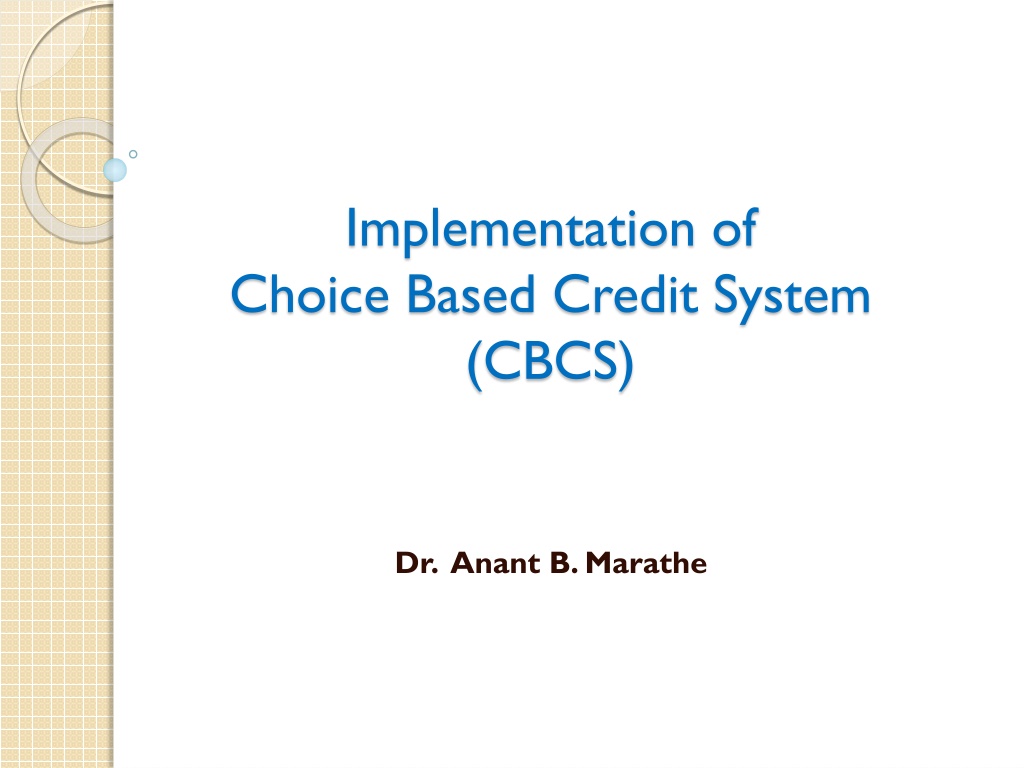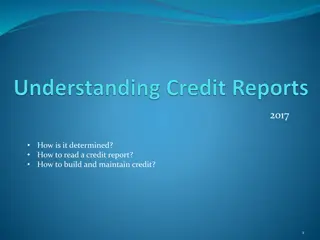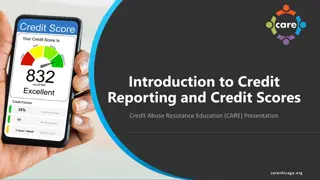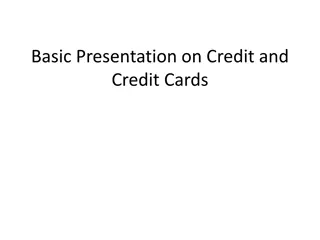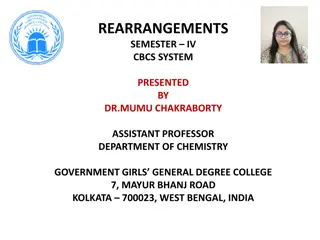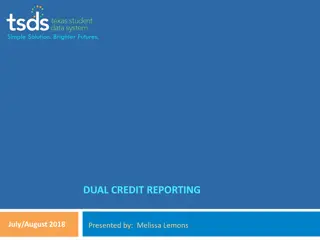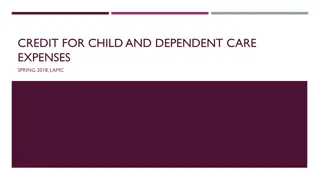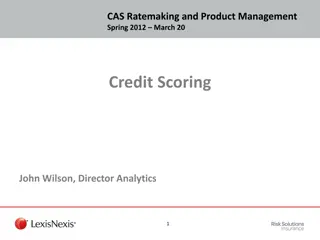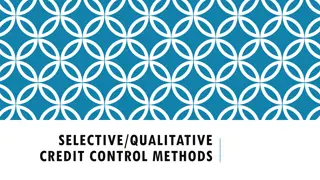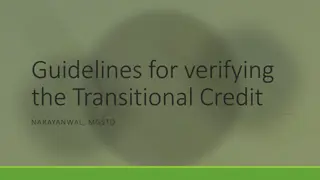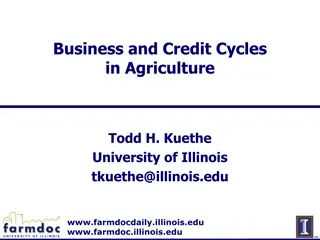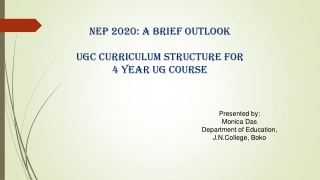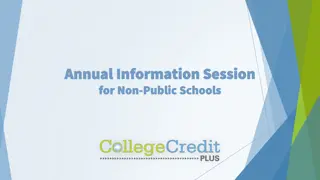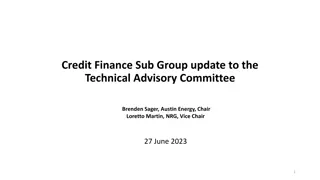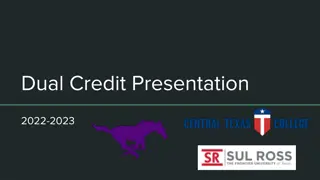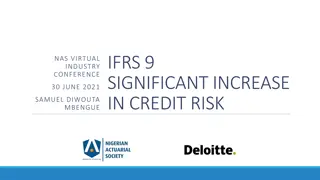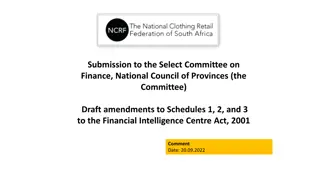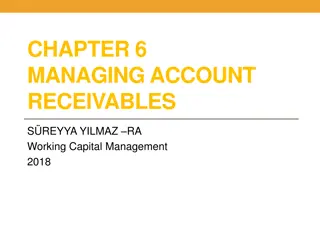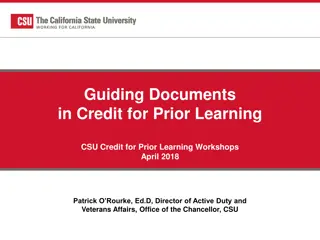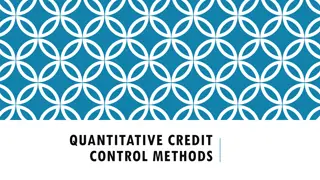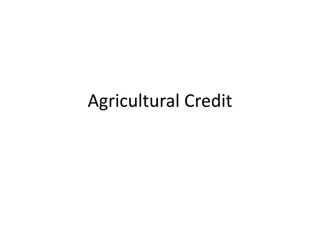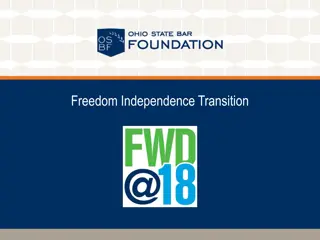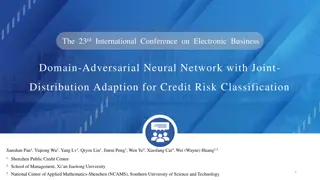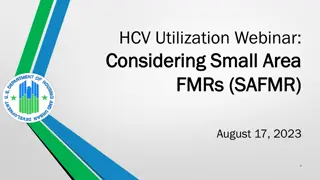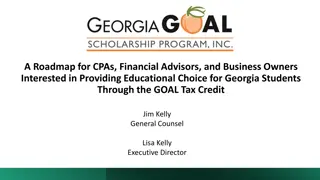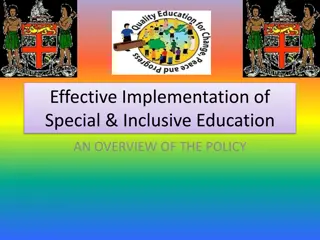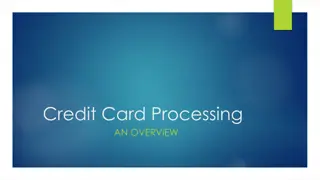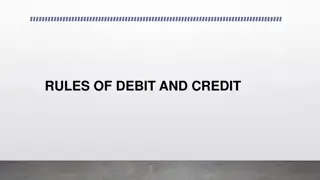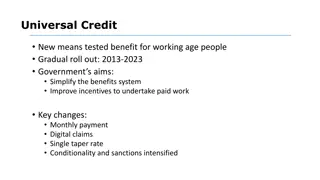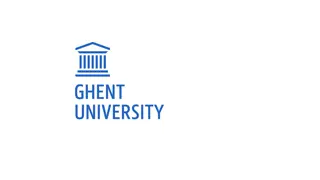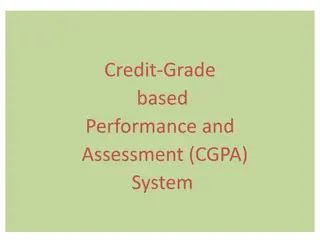Implementation of Choice Based Credit System (CBCS) in Education
Implementation of CBCS involves various components such as Ancillary Credit Courses, Internship/Apprenticeship programs, Optional Courses, Open Elective Courses, General Interest Courses, and more. Students have the flexibility to choose courses based on their interests and can earn credits in different disciplines. The system aims to provide a diverse learning experience and enhance student engagement.
Download Presentation

Please find below an Image/Link to download the presentation.
The content on the website is provided AS IS for your information and personal use only. It may not be sold, licensed, or shared on other websites without obtaining consent from the author. Download presentation by click this link. If you encounter any issues during the download, it is possible that the publisher has removed the file from their server.
E N D
Presentation Transcript
Implementation of Choice Based Credit System (CBCS) Dr. Anant B. Marathe
Ancillary Credit Courses ( College Level) Induction programme : (At the beginning of Semester- I) Internship/Apprenticeship/ Field Work/ Work Experience : (During Winter/Summer Vacations of semester- I to V)
Optional Courses Open Elective Course (OEC) :- (Semester- I to VI) The group of different choice based courses comprising of general interest courses related to discipline specific core (DSC) subjects or of interdisciplinary nature, MOOCs offered by different authorized agencies,open skill courses.
Open Elective Course (OEC) may be opted from Semester I to Semester VI:- Students can select one or more of these courses. These courses shall be of intra-disciplinary as well as inter-disciplinary nature. Students can earn cumulatively maximum 5 Credits in this course.
i)General Interest Course (GIC) ii)Skill Course iii) MOOC OR Extracurricular and co-curricular activities :- (In all semesters)
General Interest Course (GIC) General Interest Courses shall be from different programmes/disciplines and the curriculum of these courses shall be as prescribed by the University. The student may opt any course of any other discipline /faculty of his/her interest as GIC. The nature of these courses shall be self study under the guidance of concerned teacher/ mentor/ faculty member/guide
If the concerned subject teacher / faculty member/ mentor / college/institute / other than the college / institute / university department where the student has taken admission to pursue regular course of study, then the credit earned by the student should be submitted by the teacher / faculty member / mentor / guide through the Principal of the parent institute. In such cases, the consent from the Principal of parent institute and the concerned teacher/ faculty member / mentor / guide should be obtained by the student before commencement of the course. guide is from the
This course will be evaluated by the concerned teacher / faculty member at the college/Department level and the Credit shall be communicated to the University before the start of VI semester examination
Skill Course:-The students will be offered Skill Courses. The courses shall be designed by respective Boards of Studies or by concerned Sector Skill Council / National Skill Development Councils (NSDC). The Skill courses may be designed by the Colleges / Institutes/departments and after approval of the University it may be offered to the students. This course will be evaluated by the concerned teacher / faculty member at the college level and the credit shall be communicated to the University before the start of VI semester examination. For the skill courses opted from Sector Skill Council (SSC) or NSDC, the evaluation may be done by respective council & the credit shall be communicated to the University before the start of VI semester examination.
MOOC :- The students may opt MOOC courses identified by the teacher/mentor/faculty member and maximum 5 credits may be earned by the students after successful completion of these MOOC courses with a minimum 75 hours of course for on different online training platforms. The concerned teacher / faculty member shall act as a mentor and based on the students performance in the course, the teacher/mentor/faculty member shall award Credits in accordance with the Marks/Grades given by SWAYAM etc. After mapping with University grading system (given separately with exam scheme), the college/institution/ shall communicate them to the university before the start of VI semester examination. College/University department can develop MOOC related to their concerned subject and after the approval of the University, these courses may be offered to the students. These courses shall be of intra- disciplinary as well as inter disciplinary nature.
Extracurricular and co-curricular activities :- (In all semesters) The students may earn maximum cumulative 5 credits from the activities as given in Table No.2, 3 &4 after securing rank/ participation at College / University /State/ Zone/ National / International level events. These credits shall be transferred in option to Open Elective Course (OEC) so that these performers shall be given relaxation from undertaking this course. These credits can be earned during the entire degree course period but before the start of VI Sem examination. These credits will be reflected in the final semester Grade Report. The mentor/ concerned teacher/faculty member shall award the Credits to the student based on his/her performance and college department / Institution/university
Comprehensive Credit Distribution Credits at Levels Univer- sity S. N. Activities State Nat ional Internation al if exist College Zone if exist 1 2 Unnat Bharat Abhiyan[UBA] Sports activities (see table no. 4) 1 1 2 3 4 5 6 1 / 2 2 / 3 3 / 4 4 / 5 5 / 6 3 4 5 Cultural activities N.S.S. activities Camps Academic activities like review paper presentations, Aavishkar, start-up, Hackathon, Quiz competitions, other curricular, coocurricular activities, students exchange programme etc. Research Paper published/presented 1 1 2 2 3 3 4 4 5 5 6 6 1 2 3 4 5 6 -- 1 2 - 4 6 6 Participation in Summer school/ Winter 2 Credits School / Short term course (not less than 30 hours 1 or 2 weeks duration) 4 Credits (not less than 60 hours 2 or 3 weeks duration) 2 Credits Scientific Surveys, Societal Surveys 1 Credit Field Visits, Study tours, Industrial Visits, NCC activities 7 As given in Table-5
Credit Distribution for Sports Sr. No. Particulars of Sports Status ( Individual/ Team ) Credits 1 College Level Participation 1 2 University Level Participation 1 3 University Level Rank 1, 2, 3 2 4 State Level Participation 2 5 State Level Rank 1, 2, 3 3 6 Zonal Level Participation 3 7 Zonal Level Rank 1, 2, 3 4 8 National Level Participation 4 9 National Level Rank 1, 2, 3 5 10 International Level Participation 5 11 International Level 1,2,3 6
Credit Distribution for NCC activities Sr. No. Particulars of NCC Activities Credits 1 Participation in NCC activities 1 2 2 B Certificate obtained 3 3 C Certificate obtained 4 State Level Participation 4 5 National level Participation 5 6 International Level Participation 6
Table-A Ancillary Credit courses Teaching Learning Training Period (Hours ) Performa- nce Evaluation Mode Min. Pass- ing Grade/Ran k Exam or No-examCredit/s Organised by Sem- ester Evaluation Authority Sr. NoCourse/Programs Nature Earned Induction Program Man- datory College/ Institute College/ Institute Evaluation participation I 30 Non-exam 1 1 Internship / Apprenticeship /Field work/ Work Experience Man- datory Organi- sation/ Industry/ College/ Institute Organi- sation/ Industry/ College/ Institute Score-sheet of Performa- nce Non-exam I to V 150 2 2 Envirnmental studies semester College College Survey , Project report, Test etc. Certification fromconcern ed Authority 3 Mandator y III 30 - Non-exam 2 Open Elective Course GIC/Skill/ MOOC Online/Offli ne Mode/SWA YAM/SSC/N SDC/college /institute SWAYAM/ NPTEL/ College/ Institute/SSC/ NSDC optional Exam or Non Exam I to VI 75 P 5 4 Co-curricular / Extracurricular Activities As per Table 2, 3 & 4 Organiser as per level of activity As per para 14 (D) Table 2, 3 and 4 optional Non-exam Not applicable I to VI Adequate as per activity 5 5
Note :- 1) Minimum 10% credits are mandatory to be earned by all the students from Ancillary Credit Courses as mentioned in Table A 2) Record of student s Performance cum Evaluation ( containing attendance, concept knowledge, intellectual/ decision making ability, handling skill, sense of responsibility, cooperative/leadership quality, presentation/demonstration ) related to Internship /Apprenticeship/Field work/Work Experience shall be maintained by the college/institute/university department 3) For allotment of Internship /Apprenticeship/Field Work/Work Experience, the college/ institute/university department shall follow standard operating procedures (SOP) with concerned college/institute/university department/organisation/ industry on the basis of Memorandum Of Understanding (MOU) /Letter of Intent and Joining letter. Further, for validation, progress records, Evaluation Sheet etc. shall be maintained by the college/institute/university department. 4) College/ Institute/university department shall submit credit report for other Credit Courses as per Table A to the University.
Schemes of Teaching and Learning Internship /Field Work / Work Experience will be conducted after I semester till Vth semester in vacations for minimum 150 hrs. It's credits and grades will be reflected in final semester VI credit grade report. DSE : The student can select any one of the following discipline specific courses. 1 . 2.......... 3............. OEC (Optional) i.e. GIC/MOOC/Skill Course can be studied during semester I to VI, Its credits and grades will be reflected in final semester VI credit grade report Project/dissertation if applicable may be offered to fifth and/or sixth semester. If offered in both semesters, it will be internally evaluated in fifth semester and internally & externally evaluated in sixth semester
Course Credit Summary Semester DSC AEC GOEC DSE Other Exam Credit / Courses Ancillary Credit Courses No. of Courses Total Credits No. of Courses 02 02 Total Credits 02 02 No. of Courses 01 01 Total Credits 02 02 No. of Courses - Total Credits - First Second Third Fourth Fifth Sixth Total - Induction Internship OEC curricular Co- curricular Extra curricular Activities Project or dissertation A) Total Credits of (DSC + DSE) = . B) Total Credits of Ancillary Credit Courses = C) Total Credits of (AEC + GOEC + Other Exam. Courses ): D) Total Credits Offered : A + B + C
Minimum No. of Credits to be earned to be eligible to get the Degree : E (E < D) Minimum No. of credits from (DSC+DSE) course to be eligible to get the degree : 80% of E Minimum No. of credits from Ancillary credits courses to be earned : 10% of E No. of credits from any University courses : 10% of E
